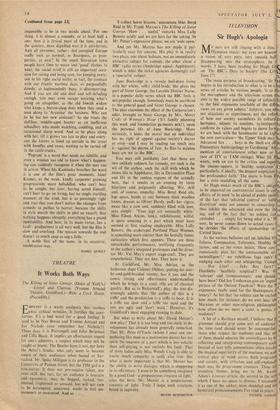THEATRE
It Works Both Ways .
The Killing of Sister George. (Duke of York's.) --Lionel and Clarissa. (Yvonne Arnaud Theatre, Guildford.)—Ride a Cock Horse. (Piccadilly.)
MPATHY is a warm analgesia that soothes Elaway critical wrinkles. It fortifies the over- forties. It's a bad word for a good feeling. It used to be Nye Bevan and Yvonne Arnaud and Joy Nichols (you remember Joy Nichols?). These days it is Pietrangeli and John Betjeman and Cilia Black. It implies an affectionate regard for one's admirers, a respect which may not be taught or learnt. The Beatles have it not, nor have the Actor's Studio, who only seem to become aware of their audiences when booed or bar- racked. Mr. Spike Milligan is its professor in the University of Panton Street, but the TIM girl is a non-starter. It does not pre-require talent, nor even skill, but tact, for an audience is insecure and egocentric, may be begged, racked, tor- mented, frightened or amused, but will not care to be harangued, unnerved, made to feel un- necessary or unwanted. And so . .
'I collect horse brasses,' announces Miss Beryl Reid in Mr. Frank Marcus's The Killing of Sister George. 'How . . . useful,' remarks Miss Lally Bowers acidly and we are hers for the asking. In Mr. Pinter's expressive phrase, we are 'wide open.'
And yet Mr. Marcus has not made it par- ticularly easy for anyone. His play is in reality two plays, one about lesbians, not an immediately attractive subject for comedy, the other about a BBC radio series (Ambridge equals Applehurst), which is what the ticket agencies damningly call a 'specialist' subject.
June Buckridge is a tweedy bull-dyke living with her whiny, sulky child-bride. She plays the part of Sister George. the Lovable District Nurse, in a popular daily series which the BBC feels is not popular enough. Somebody must be sacrificed to the general good and Sister George is chosen. The play examines the effect of the Corporation's edict, brought to Sister George by Mrs. Mercy Croft of Woman's Hour (`H's family planning this week and foundation garments next'), upon the personal life of June Buckridge. More seriously, it hides the moral that an individual has no right of appeal against society's decree or even--and I may be reading too much into it—against the decree of fate. As flies to wanton boys are we to the BBC. . . .
You may still justifiably feel that these are two unlikely subjects for comedy, yet such is the wit of the author, such the skill with which he mixes life in Applehurst, life in Devonshire Place and life in the sunless regions of the sexually bent, that it results in an evening by turns hilarious and poignantly affecting. Wit, skill and, of course, empathy. Miss Beryl Reid sits, legs apart,. hands at rest between thick woollen knees, dresses as Oliver Hardy, puffs her cigars, moos like a cow and, suddenly filled with love, says simply: 'Your legs are unusually white.' Miss Eileen Atkins, lanky, exhibitionist, wilful, is quite amazing in a part which must have seemed at first reading unplayable. Miss Lally Bowers, the archetypal Portland Place Woman, is something more sinister than the brutally funny caricature which first appears. These are three remarkable performances, testifying eloquently to the author's imagined grotesques and the direc- tor Mr. Val May's expert stage-craft. They are empathetical. They are fine. They have it.
At Guildford, Mr. Max Adrian, as the lecherous dupe Colonel Oldboy, patting his scar- let-and-gold-braided tummy, has it too, and the comic timing and affectionate understanding which he brings to a stock role are of classical quality. But as to Bickerstaff's play, the text dis- armingly admits that 'the author of this is a trifle' and the production is a trifle to boot. It is a trifle too slow and a trifle too staid and the sets are ugly and 'don't work.' However, it's Guildford's most engaging evening to date.
But what to write about Mr. David Mercer's new play? That it is too long and too static in de- velopment has already been generally remarked.
That Mr. Peter O'Toole (whom I once saw em- pathising like mad as a pantomime dame) has not quite the measure of a part which is less volatile than self-pitying is not entirely his fault. That
of three ladies only Miss Wendy Craig is able, to excite much sympathy is sadly also true. But
what is more important is that Mr. Mercer has the ability to write dialogue which is staggering in its effrontery. 'I want to be something imagined by a good God--a preposterous creature of light,' cries the hero. Mr. Mercer is a preposterous creature of light. Truly I hope such creatures breed in captivity.
DAVID BENEDICTUS










































 Previous page
Previous page